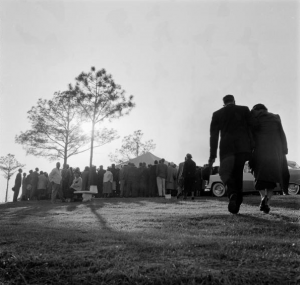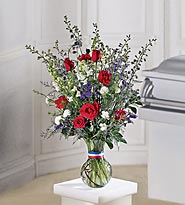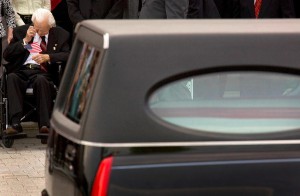Funeral Etiquette
Funeral Etiquette for
the Family of the Deceased
It’s not always easy to know what to say or do at a time of loss. Just being there for a friend or family member can be a comfort. However, there is funeral etiquette to be followed when someone passes away. Customs for expressing sympathy vary according to religious and ethnic background. The following information is a suggested guideline for what is generally accepted during a funeral. It is best to be aware of expectations to avoid acting in an inappropriate manner.
When to Notify?
The immediate family should receive notification first, preferably in-person or by telephone, followed by the closest relatives and friends. Be sure to provide the name and address of the funeral home for the delivery of funeral flowers. The service details can be relayed later when available
Dress Code?
Though it is no longer necessary to dress in black, do show respect when picking out your funeral attire. Conservative suits or dress-clothes, in dark, respectful colors are most appropriate. It is advisable to avoid floral or busy patterns.
What are Typical Visitation Rights?
Upon learning of a death, it is customary for intimate friends of the family to visit the family either at their residence or funeral home. It would probably be more comfortable for all concerned to meet and learn more about their funeral home services since they are fully prepared for visitors. Each family should decide the number of family members needed during calling hours.
It is also not necessary for family members to engage in long conversations; a simple “Thank you, it means so much to have friends like you at this time,” is adequate. If the casket is open during calling hours, some visitors may want to bid farewell to the deceased. Although sometimes a visitor will request that a family member accompany them to view the body, it is not a requirement.
Funeral Service Duration?
Modern funeral or memorial services are usually brief and last approximately 30 minutes.
Cemetery Service Duration?
The graveside service tends to be brief. Customarily, once the commitment ritual is complete and the casket has been lowered to ground level, the family typically departs. The casket is then placed in a vault, interred, and funeral flowers placed on the grave.
What Typically Happens Immediately After the Memorial Service ?
Immediately after the funeral service, the family sometimes invites the attendees to join them for food or a reception at their home or designated place. This gives everyone a chance to talk and provides some time to relax and refresh. Sometimes friends or church members will take it upon themselves to prepare food ahead of time and relieve the family of this task.
How Should You Respond After the Funeral?
For several days after the service, the family should be permitted to rest and have time to handle the myriad details that accompany such an occasion. While some families enjoy the diversion of visits and calls from friends and family, others prefer complete privacy. It is not inconsiderate to cut short calls at this time.
What About Sending Thank You Notes?
Most Funeral Directors can supply you with generalized thank you cards or the family may choose to send a more personal thank you note. The thank you notes should be a concise, personal, and specific. Also, yielding to modern tradition, a simple thank you card with a signature is accepted, with or without a personal note
Who Should Get a Thank You Note?
1. Anyone who sent a gift or card to the family deserves a thank you note. This would include anyone who sent funeral flowers, brought food, sent a memorial contribution, or in some other substantial way acknowledged the deceased. The notes should be sent within two weeks of the death
2. A personal note is suggested for thanking the clergy person. If an offering or donation is sent, send it in a separate envelope. Never include it in the thank you note
3. Pallbearers should also be sent a personal message of thanks
4. For individuals who sent funeral flowers, you may wish to send a personal note or sympathy card. Including a sympathy poem or sympathy quote that expresses your feelings is always thoughtful.
5. For groups or organizations that sent flowers, send a note to the head of the group and remember to include all the members of the group in your note. If individual member names appear on the floral card, a separate note should be sent to each one but a personal message is not necessary.
6. Friends who have volunteered their time and effort helping in any way deserve a separate written thank you. If the volunteers are close to the family, you may prefer to thank them in person.
Upon Receiving the News ? When learning that a relative or friend has died, you should express your condolences and offer assistance as soon as possible. Only very close friends of the deceased and the immediate family are expected to visit the family before the funeral. Let the family know if you will be attending the funeral. It is important to keep the conversation brief taking in account their emotional state of grief and loss, and that they will be receiving numerous similar calls.
Funeral Flowers Etiquette?
Unless the family asks that donations should be made in lieu of flowers, you should honor their request. Many people consider it obligatory to send flowers unless there is a prohibitive note in the newspaper notice.
Thoughtful Memorial Gifts:
1. Food for the Family? Food is always a welcome gift as there are always visitors around that need to be fed. Make sure to prepare dishes that require little preparation.
2. E-mail? E-mail is only appropriate from those who are not intimate with the family such as a business associate.
3. Phone Calls? All calls should be as brief as possible.
4. Mass Cards? If the deceased was a Catholic, some people will send a mass card instead of or in addition to flowers. Catholics and non-Catholics can arrange for a mass to be said for the deceased
5. Donation to Suggested Charity? Usually the family will designate a specific organization or charity. Remember to provide the family’s name and address to the charity so they can send proper notification. Often the funeral home will offer a direct link to the charity requested by the family
Dress Etiquette?
Though it is no longer necessary to dress in black, do show respect when picking out your funeral attire. Conservative suits or dress-clothes, in dark, respectful colors are most appropriate. It is advisable to avoid floral or busy patterns
When Paying Respects ?
It is traditional for friends to visit the funeral home prior to the day of the funeral or memorial service. The obituary in the newspaper will have the details as to the day and time for visitations
Etiquette for Casket Viewing?
Before or after the service, friends will often go up to the casket for a final farewell. It is not obligatory and is totally left to your discretion
Attending the Service ?
It is suggested that one arrive at the funeral home at least ten minutes before the service begins. Funeral services usually start on time and it is considered rude to be late. Enter quietly and be seated. Do not conduct an animated discussion in the chapel; the mood should be somber. Do not try to talk with family members you feel are suffering from bereavement if you arrive early. The first few rows are reserved for family members. At the conclusion of the service, you will want to leave promptly and wait in your car if you plan to follow the procession to the cemetery. Remember to turn your headlights on so you can be identified as being a part of the procession. The headlights are to be turned off once you arrive at the cemetery. Attending the graveside service is optional and is usually determined by the relationship between the individual and the bereaved family.











